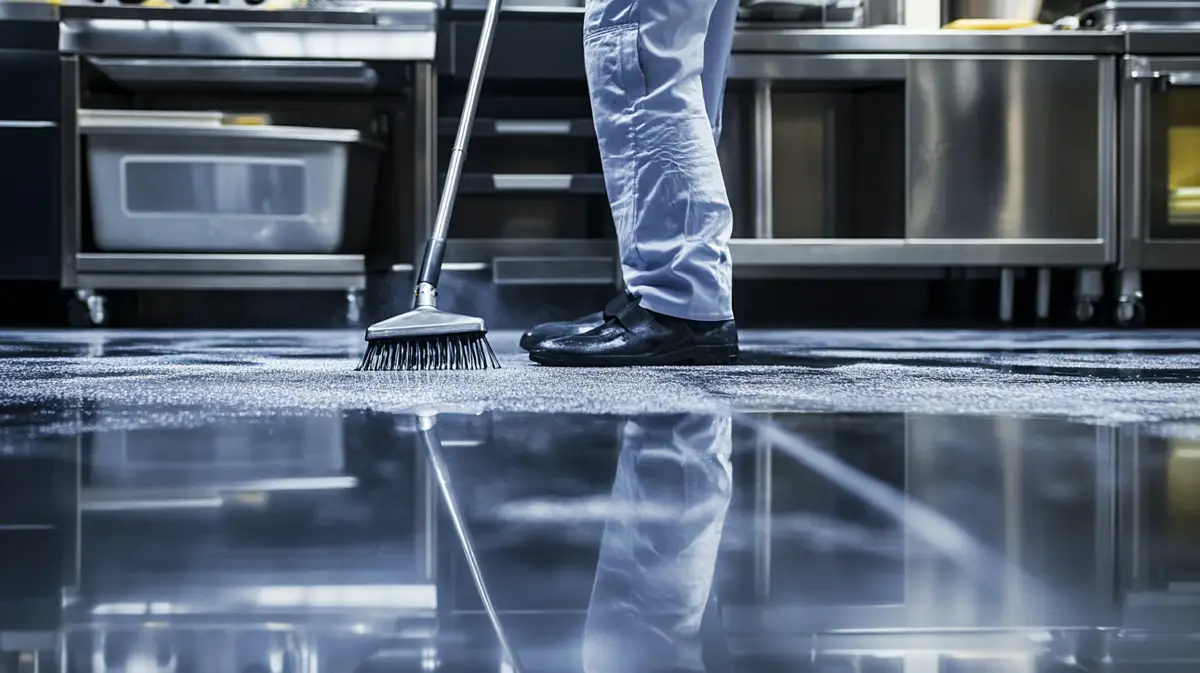How Professional Kitchen Cleaning Can Improve Your FSA Food Hygiene Rating

The Food Standards Agency (FSA) Food Hygiene Rating is a vital indicator of a business’s cleanliness, food handling, and overall hygiene standards. It provides a score from 0 to 5, where 5 indicates very good hygiene, and 0 means urgent improvement is necessary.
Local authorities carry out inspections, assessing how food is stored, prepared, and handled. They also review the cleanliness of the premises, including worktops, floors, and equipment. The FSA rating is publicly available and can significantly impact a business’s reputation. Customers are increasingly aware of hygiene scores and often choose where to eat based on these ratings.
Ensuring your commercial kitchen maintains high standards is crucial to avoiding a poor rating, which could result in lost business or, worse, fines and closures. Regular commercial kitchen cleaning plays an essential role in helping businesses stay compliant with food safety laws and achieve a high rating, which in turn helps build customer trust and loyalty.
Common Kitchen Hygiene Issues That Affect Ratings
Several common hygiene problems can lead to a lower FSA Food Hygiene Rating, often due to poor cleaning practices. Below are the key issues inspectors look for:
- Dirty Surfaces and Equipment: Accumulation of grease, food debris, and bacteria on worktops and cooking tools.
- Poor Waste Management: Inadequate disposal and cleaning of waste areas, leading to pest infestations.
- Cross-Contamination: Harmful bacteria spreading from raw to cooked foods due to improper cleaning of surfaces and utensils.
- Inadequate Hand Washing Facilities: Lack of soap, towels, and hot water for staff to wash hands effectively.
- Grease Build-up in Ventilation: Grease accumulation in vents and ducts, leading to contamination risks and fire hazards.
Addressing these issues through professional fsa hygiene rating cleaning can help ensure compliance with food safety regulations and improve your rating.
The Role of Professional Cleaning in Achieving Top Hygiene Standards
Maintaining a high FSA Food Hygiene Rating requires more than just daily cleaning by kitchen staff. Professional cleaning services are equipped to handle deep cleaning tasks that are often missed or too complex for regular staff. Here’s how professional cleaning can make a difference:
- Thorough Cleaning of Hard-to-Reach Areas: Professionals can access and clean areas like ventilation systems, behind equipment, and deep in kitchen corners where grease and grime build up unnoticed.
- Specialist Equipment and Products: Professional cleaners use industry-grade products and tools designed to effectively eliminate bacteria and grease, ensuring all surfaces meet hygiene standards.
- Scheduled Deep Cleans: Regular deep cleaning services help maintain hygiene over the long term, ensuring that critical areas are sanitised on a schedule, reducing the risk of contamination.
- Compliance with Hygiene Regulations: Trained cleaning teams understand the requirements for hygiene certification and ensure your kitchen complies with all necessary standards, improving your chances of a high FSA rating.
- Expert Knowledge: Professionals know which areas are most likely to cause hygiene issues during inspections and can target those areas to ensure they are properly cleaned.
By investing in professional cleaning, businesses can reduce the risk of hygiene breaches, ensuring their kitchen is always ready for inspection and maximising the chance of securing a top hygiene rating.
Steps to Improve Your FSA Rating with a Professional Clean
Improving your FSA Food Hygiene Rating through professional commercial cleaning services involves a few key steps. By following these, your business can be better prepared for inspections and ensure high standards are consistently met:
- Conduct a Hygiene Audit: Start by scheduling a professional hygiene assessment to identify problem areas in your kitchen. This will give you a clear understanding of what needs attention before the next inspection.
- Deep Clean Key Areas: Focus on areas that are often missed by daily cleaning, such as under appliances, in ventilation systems, and behind equipment. A professional deep clean targets these hidden spots, ensuring no dirt or bacteria is left behind.
- Implement a Cleaning Schedule: Work with your professional cleaning provider to develop a routine cleaning schedule that ensures high standards are maintained. Regular deep cleans combined with daily maintenance keep hygiene consistent.
- Train Staff on Best Practices: While professional cleaners handle deep cleaning, it’s essential that your staff are trained in maintaining cleanliness between visits. This includes proper handling of food, cleaning of surfaces, and waste management.
- Review and Update Regularly: After each professional clean, review the hygiene standards in your kitchen and make adjustments where necessary. Continuous improvement ensures you stay ahead of any potential issues.
By following these steps, your kitchen will be well-prepared for an FSA inspection, increasing the likelihood of achieving a high food hygiene rating.
Maintaining High Hygiene Standards for Long-Term Success
Achieving a high FSA Food Hygiene Rating is not a one-off task – it requires ongoing commitment to cleanliness and hygiene in your commercial kitchen. To ensure long-term success, it’s essential to put systems in place that will help maintain these standards consistently.
Regular professional cleaning should be a key part of your kitchen’s maintenance strategy. By scheduling routine deep cleans, you can address areas that everyday cleaning may miss, ensuring that your kitchen remains compliant with food safety regulations.
It’s equally important to instill good hygiene practices among your staff. Training employees on proper cleaning methods, safe food handling, and waste disposal will ensure that cleanliness is maintained between professional cleans.
Finally, conducting regular hygiene assessments, even when no inspection is due, helps you stay ahead of potential issues. Identifying and addressing problems early reduces the risk of receiving a poor rating during an inspection and keeps your kitchen running smoothly.
Incorporating these practices into your business operations will help you uphold high hygiene standards, protecting your reputation and ensuring the long-term success of your food business.










